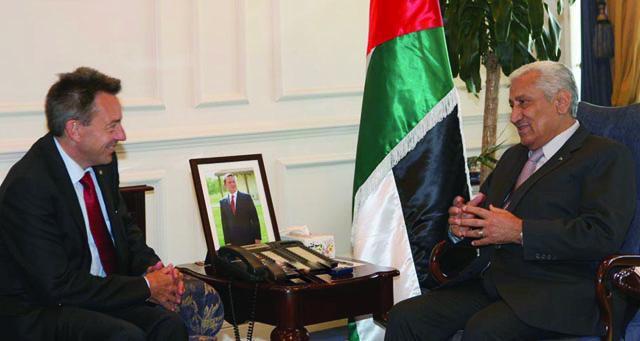You are here
‘Int’l community should reward refugee host communities’ generosity’
By Muath Freij - Mar 05,2015 - Last updated at Mar 05,2015
DEAD SEA — The unprecedented flow of refugees is putting an equally unprecedented strain on the economies and infrastructures of host countries like Jordan, Lebanon and Turkey with respective political consequences, the International Committee of the Red Cross (ICRC) said Thursday.
At the final session of the Middle East and North Africa Regional Consultation for the World Humanitarian Summit, ICRC President Peter Maurer said the region has demonstrated extraordinary generosity in welcoming and hosting refugees as their own.
“They opened access to hospitals, local schools and some livelihood opportunities. The humanitarian response has been, first and foremost, driven by local communities,” he added.
Yet, it is normal that as time goes by, without a perspective for sustainable solutions, that relations between host communities and displaced populations are getting more complicated, Maurer noted.
Speaking to The Jordan Times after the end of the session, the ICRC president said it is important to support local communities for their generosity.
“There is tension building up between the local and refugee communities because aid is not distributed equally and local communities are forgotten,” Maurer noted.
In the last two or three years, the ICRC in Jordan and Lebanon has increasingly started to support local communities that accepted refugee populations, he added.
Asked about the impact of the growing number of armed terror groups such as Daesh on relief work, Maurer said it is “a huge problem in this region and in some other regions in the world”.
“Humanitarian actors have increasing difficulties accessing people in need and the reason is we are confronted by an increasing number of very radical groups taking civilian populations hostage. This is happening in northern Nigeria, to this region, to other parts of the world, and it is a big concern.”
In his remarks at the conference, Maurer said the international community is not as present, active and involved as it should be, sharing the refugee burden in the Middle East.
“We see major difficulties to secure sustainable financing for humanitarian action. The lasting emergency does not always translate into lasting financial support, despite all efforts undertaken,” he added.
Maurer said humanitarian actors — local and international — are at times pressured to integrate their efforts into larger political and security agendas often at the cost of their own principles and mission.
“We see international humanitarian law being violated on a large scale, and yet the same law remains an essential axiom to orient our efforts to face current challenges,” he added.
Related Articles
AMMAN — UNRWA spokesperson Sami Mshasha on Wednesday commended the decision of the UNRWA’s General Presidency and Field Office in Jordan to
Deputising for His Majesty King Abdullah, Prime Minister Abdullah Ensour met on Monday with International Committee of the Red Cross (ICRC) President Peter Maurer and discussed international support to Jordan.
Jordan’s generosity in hosting a great number of refugees has to be a wake-up call for the international community to get to the root of the problem and prevent mass exoduses in the region, according to International Committee of The Red Cross (ICRC) President Peter Maurer.













